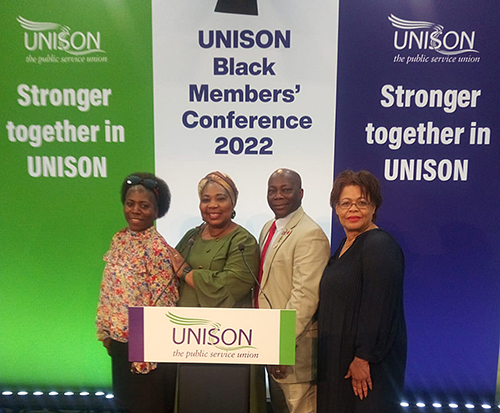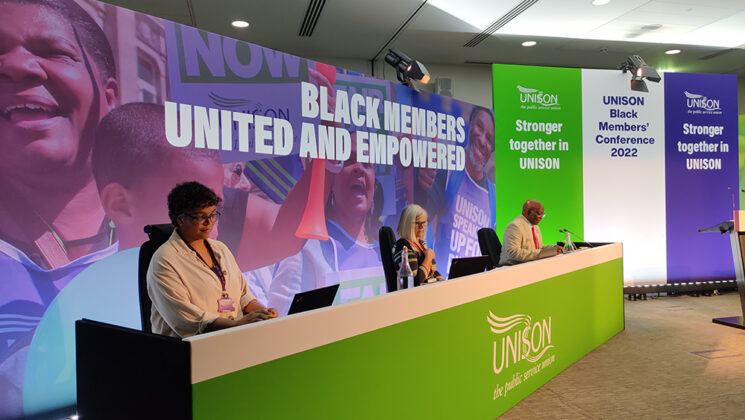Today saw the second day of UNISON’s virtual Black members’ conference, hosted by the national Black members’ committee.
The morning session was chaired by committee deputy chair Rakiya Suleiman, and the afternoon by chair Kebba Manneh.
The day began with a guest speech from Elizabeth Cameron, a lay activist and member of the national Black members’ committee, a joint chair of the disabled members’ committee, a member of the TUC race relations committee, and a former member of the union’s national executive council (NEC).
“As Black members, we need to celebrate ourselves,” she said.
Representation of Black members at NEC level was a key concern of the morning, with the conference stating that UNISON currently has the most unrepresentative structure of senior lay leaders since the union was founded 28 years ago.
At present, the union has an all-white presidential team, an all-white delegation to the TUC general council and no Black members selected as chair or vice chair of any of the seven NEC sub-committees.
A motion was also unanimously passed to improve access to more comprehensive immigration advice and representation, including to UNISON members in Northern Ireland.
UNISON affirmed its commitment to lead on campaigns against the hostile immigration environment, and to give reps and members the tools to recruit and organise Black and migrant workers.
In a similar vein, a motion was passed in solidarity with Afghan LGBT+ people who are seeking asylum and refuge in the UK, calling on the government to make explicit provision for these refugees in resettlement schemes.
The committee also agreed to work with Rainbow Migration and other appropriate organisations to lobby the Home Office to take urgent steps to improve the ways in which it deals with LGBT+ asylum seekers and refugees.

l-r: UNISON national officer for race equality Margaret Greer, national Black members’ committee deputy chair Rakiya Suleiman, national Black members’ committee chair Kebba Manneh, and UNISON head of equality Gloria Mills.
In the afternoon, delegates paid tribute to the late Pauline Wilson, a prominent Windrush campaigner, and passed a motion to affirm support for the campaign to make the compensation scheme for Windrush scandal survivors easier to navigate, moved away from the Home Office and for all those affected to be given a real apology.
Conference also declared Black members’ opposition to the Home Office’s ‘hostile environment’, with one conference delegate saying: “We are public service defenders, not immigration border guards”.
Another key theme of the conference included more of a concerted effort to support Black members with their mental health, particularly helping employers to support staff with their mental health, and signposting Black workers to current support and mental health services.
This came with the recognition that Black communities experience complex factors that significantly and adversely affect their mental health and contribute to disparities in diagnosis and treatment, including colonialism, health inequalities and the impact of racism.
Conference noted that Black people are over four times more likely than white people to be detained under mental health legislation and over 10 times more likely to be subject to a community treatment order, under which people are discharged from detention but placed under certain conditions.
Emergency motions passed on this second day of conference also included safeguarding Black girls in schools, in reference to Child Q, the 15-year-old Black girl subjected to a traumatising police strip search whilst menstruating, and to deal with anti-racism within the NHS workforce.

